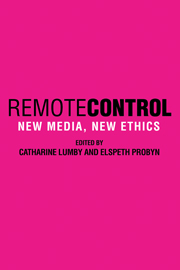Book contents
- Frontmatter
- Contents
- List of Contributors
- Acknowledgements
- 1 Introduction: An Ethics of Engagement
- 2 Real Appeal: The Ethics of Reality TV
- 3 Arguing about Ethics
- 4 ‘Their own media in their own language’
- Beyond the Disconnect: Practical Ethics
- 5 A Viable Ethics: Journalists and the ‘Ethnic Question’
- 6 Ethics, Entertainment and the Tabloid: The Case of Talkback Radio in Australia
- Money versus Ethics
- 7 Eating into Ethics: Passion, Food and Journalism
- Beyond Food Porn
- 8 Ethics impossible? Advertising and the Infomercial
- Pitching to the ‘Tribes’: New Ad Techniques
- 9 Diary of a Webdiarist: Ethics Goes Online
- 10 Control-SHIFT: Censorship and the Internet
- Representing the Asylum Seekers
- 11 The Ethics of Porn on the Net
- Ethics and Sex
- 12 Grassroots Ethics: The Case of Souths versus News Corporation
- 13 Great Pretenders: Ethics and the Rise of Pranksterism
- The Limits of Satire
- Index
12 - Grassroots Ethics: The Case of Souths versus News Corporation
Published online by Cambridge University Press: 18 December 2009
- Frontmatter
- Contents
- List of Contributors
- Acknowledgements
- 1 Introduction: An Ethics of Engagement
- 2 Real Appeal: The Ethics of Reality TV
- 3 Arguing about Ethics
- 4 ‘Their own media in their own language’
- Beyond the Disconnect: Practical Ethics
- 5 A Viable Ethics: Journalists and the ‘Ethnic Question’
- 6 Ethics, Entertainment and the Tabloid: The Case of Talkback Radio in Australia
- Money versus Ethics
- 7 Eating into Ethics: Passion, Food and Journalism
- Beyond Food Porn
- 8 Ethics impossible? Advertising and the Infomercial
- Pitching to the ‘Tribes’: New Ad Techniques
- 9 Diary of a Webdiarist: Ethics Goes Online
- 10 Control-SHIFT: Censorship and the Internet
- Representing the Asylum Seekers
- 11 The Ethics of Porn on the Net
- Ethics and Sex
- 12 Grassroots Ethics: The Case of Souths versus News Corporation
- 13 Great Pretenders: Ethics and the Rise of Pranksterism
- The Limits of Satire
- Index
Summary
ON 10 OCTOBER 1999, AN ESTIMATED 40 000 PEOPLE RALLIED THROUGH Sydney's CBD in one of the city's largest demonstrations since the Vietnam War. Protesting against the level of corporate influence shaping Australian culture, speakers and marchers demanded that multinational companies listen to community groups. In part a protest against the media's intrusion into ordinary people's lives and passions, the rally was nonetheless sympathetically and widely reported. As the lead item of Sydney's Channel Nine news bulletin, for example, it was portrayed as a mass demonstration against the destruction of a much-loved community institution by a global media organisation. The thousands at the rally opposed the idea that important economic and cultural issues should be determined by, as one speaker put it, a group of ‘faceless, gutless bludgers’ who had failed to explain to the public why unpopular decisions were being made. As the rally-goers made clear, however, the fight was only just beginning. A year later, faced with the likely disappearance of a popular Sydney icon, nearly 100 000 marched in support of the same cause.
The National Rugby League's (NRL) 1999 decision to exclude South Sydney (known as Souths, or the Rabbitohs) from future competitions sparked a level of community activism rarely seen in Australia. The Sydney Morning Herald called this activism ‘Passion Play’. Paul Kent suggested that the feeling shown by Souths fans illustrated the emotional poverty of News Limited's ownership of Australia's premier rugby league competition:
- Type
- Chapter
- Information
- Remote ControlNew Media, New Ethics, pp. 216 - 229Publisher: Cambridge University PressPrint publication year: 2003



